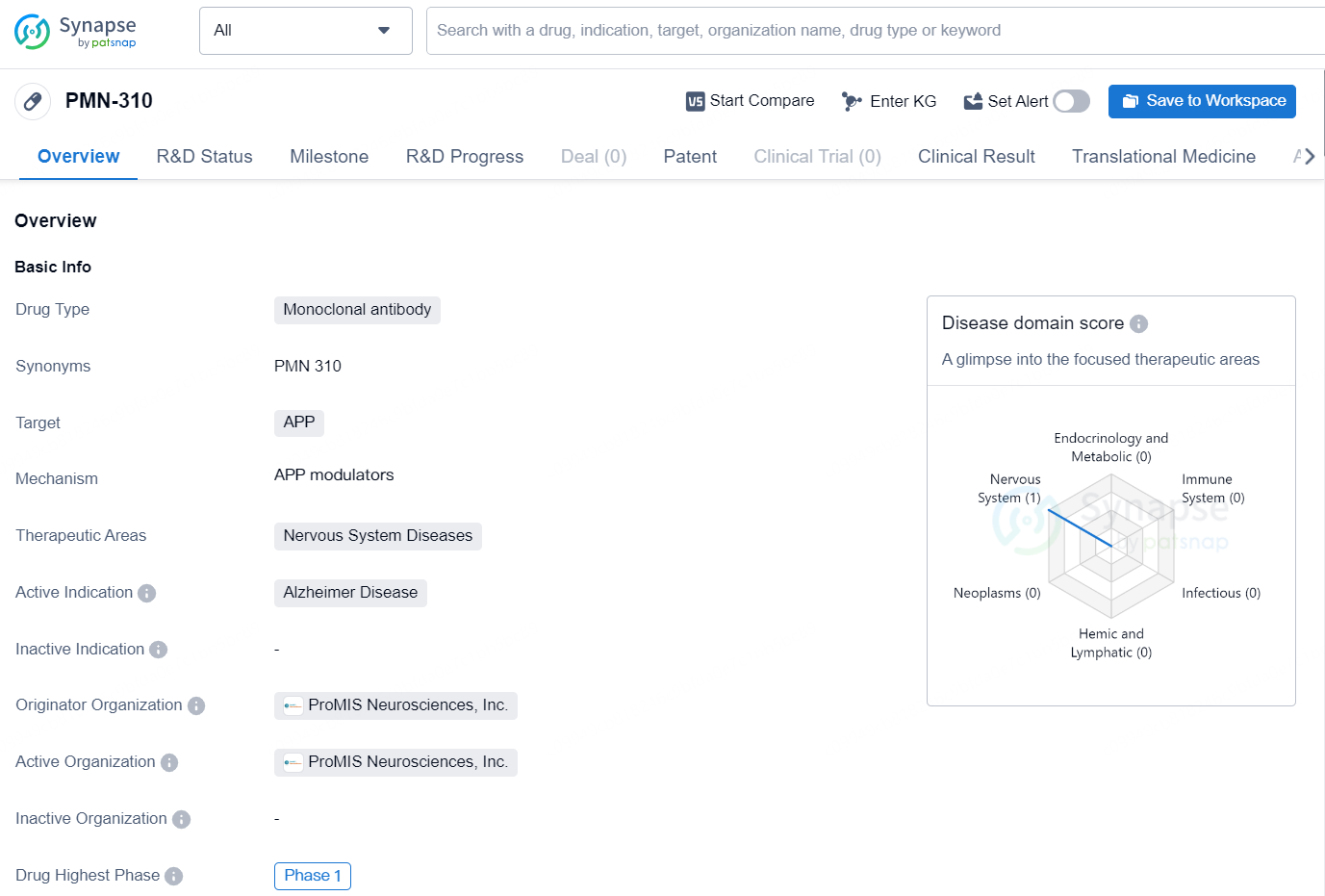Promising Phase 1a Results of PMN310 Shared by ProMIS Neurosciences at 17th Alzheimer’s Conference
ProMIS Neurosciences Inc. (Nasdaq: PMN), a biotechnology firm dedicated to creating and advancing antibody therapeutics that target harmful misfolded proteins linked to neurodegenerative disorders such as Alzheimer’s disease (AD), amyotrophic lateral sclerosis (ALS), and multiple system atrophy (MSA), announced the positive outcomes from all five cohorts of its Phase 1a, single ascending dose clinical trial for its leading product candidate, PMN310. These findings were presented at the 17th Clinical Trials on Alzheimer’s Disease (CTAD) Conference, which is being held from October 29 to November 1, 2024, in Madrid, Spain.
👇Discover comprehensive information about this drug, from its R&D status, core patents, clinical trials to approval status in global countries, by simply clicking on the image below. Dive deep into our drug database now.
PMN310 is an experimental humanized monoclonal antibody (mAb) created to specifically target soluble amyloid beta oligomers (AβOs), which ProMIS considers to be the most harmful and pathogenic variant of Aβ, especially when compared to Aβ monomers and amyloid plaques.
The Phase 1a clinical trial was a randomized, double-blind, placebo-controlled study aimed at assessing the safety, tolerability, and pharmacokinetics of PMN310 in 40 healthy participants in the United States (NCT06105528). The results showed that PMN310 was generally well tolerated across all five single-ascending dose groups (2.5, 5, 10, 20, and 40 mg/kg) and, notably, the drug successfully penetrated the blood-brain barrier in a dose-dependent manner among healthy volunteers. The pharmacokinetic data suggest that monthly administration might achieve sufficient levels of PMN310 necessary for target engagement in Alzheimer's Disease (AD) patients. The comprehensive data from these five cohorts reaffirms the previously published findings from the first four cohorts of the Phase 1a trial revealed in July 2024.
“We are excited to share further findings from our first-in-human Phase 1a clinical trial of PMN310, which demonstrated an overall favorable tolerability profile and concentrations in the cerebrospinal fluid that suggest its capability for target engagement in AD patients,” stated Larry Altstiel, M.D., Ph.D., ProMIS Neurosciences' Chief Medical Officer. “Crucially, these findings have validated the dosing parameters for our upcoming 12-month, multiple ascending dose Phase 1b clinical trial involving 100 patients with mild cognitive impairment linked to AD and early-stage AD, which we aim to commence by the end of 2024. This marks a significant achievement for ProMIS, and we were thrilled to convey our progress at this year's CTAD Conference.”
👇Explore the latest research progress on drug-related developments, indications, therapeutic organizations, clinical trials, results, and patents by clicking on the targeted picture link below. Unfold a world of comprehensive information on this target in just a click!
According to the data provided by the Synapse Chemical, As of November 5, 2024, there are 271 investigational drugs for the APP target, including 5 indications, 160 R&D institutions involved, with related clinical trials reaching 306, and as many as 25224 patents.
PMN-310 is a monoclonal antibody drug developed by ProMIS Neurosciences, Inc., which targets the Amyloid Precursor Protein (APP) and is intended for the treatment of Alzheimer's Disease, a type of nervous system disease. As of the latest available information, the drug has reached Phase 1 of clinical development, indicating that it has been tested on a small number of healthy volunteers to assess its safety, dosage, and potential side effects. The drug is specifically designed to target the accumulation of amyloid-beta plaques in the brain, which is a hallmark characteristic of Alzheimer's Disease.






